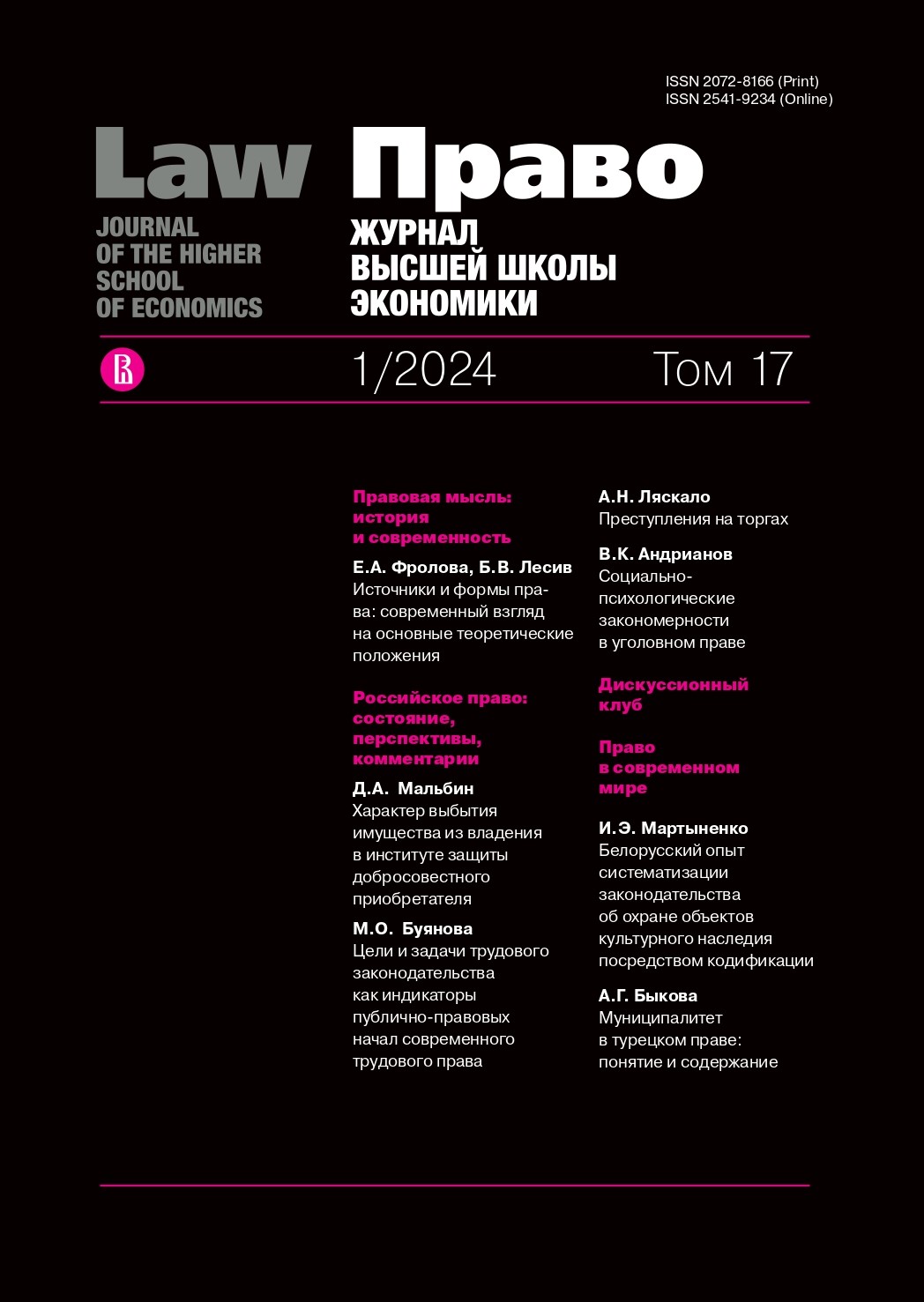Labor Legislation Goals and Tasks as Indicators of Modern Labor Law Origin in Public Law
Abstract
The article analyzes academic thought about the relationship between public law and private law principles in the regulation of labor relations. At the same time, private legal principles are present only in some institutions of labor law (social partnership, employment contract, wages, working hours, rest time). However, the state intervenes here by setting the lower limits of the agreement. All other institutions are characterized mainly by public law principles. Thus, public law principles are somehow present in all institutions of labor law and significantly prevail in most of it. Based on the study of the content of the goals and tasks of labor legislation enshrined in the Russian Labor Code, it is additionally proved that labor law belongs to the sphere of public law regulation. The Constitution of the Russian Federation fixing the basic principles of labor legislation initially defined the vector of attribution of labor law to public law science In the study of modern goals of legal regulation of labor relations, attention is drawn to the fact that the current wording in the Labor Code of the goals and tasks of labor legislation does not contribute to strengthening guarantees of labor rights of employees, creates conditions for infringement of workers’ rights achieved during the years of Soviet power and leads to increased tensions in human society, since the state supports the employer to a greater extent (and not the employee) to the detriment of his rights and legitimate interests. Meanwhile, the precise formulation and legislative consolidation of the goals and tasks of labor legislation will contribute to the development of labor relations, maintaining legality in the law enforcement activities of judicial and executive bodies of state power.
References
Alekseev V.P., Pershits A.I. (2004) A history of primitive society. Moscow: Vysshaya shkola, 279 p. (in Russ.)
Andrianovskaya I.I. (2015) Continuity in Russian labor law. Doctor of Juridical Sciences Thesis. Moscow, 325 p. (in Russ.)
Antipyeva N.V. (2011) Climatic and environmental features in system of criteria for differentiation of regulating social security of personnel. Pravo v vooruzhennyh silah=Law in the armed forces, no. 5, pp. 190-199 (in Russ.)
Arkhipov V.V. (2007) Changing terms of employment contract as a method of dismissal. Jurist=Lawyer, no. 2, pp. 75-78 (in Russ.)
Bondarenko P. M. (2023) The combination of private law and public law principles in regulation of relations arising from employment contract. Molodoy uchenyi=Young researcher, no. 34, pp. 76-78 (in Russ.)
Demidov N.V. (2020) The advantage of public law principles in labor law in Russia. Nauuchnye trudy rossiiskoy akademii juridicheskyhkh nauk=The Russian Academy of Juridical Sciences. Researches, no. 20, pp. 204-207 (in Russ.)
Dobrovolskaya A.I. (1980) Guarantees of citizens' rights in Soviet criminal proceedings. Sovetskoye gosudarstvo i pravo=Soviet State and Law, no. 2, pp. 128135 (in Russ.)
Galieva R.F. (2003) Principles of labor legislation (on materials of parliamentary hearings). Jurist=Lawyer, no. 3, pp. 53-55 (in Russ.)
Golovina S.Yu. (2008) Codification of labor legislation. In: Codification of Russian private law. D. A. Medvedev (ed.). Moscow: Statut, 447 p. (in Russ.)
Kozyrin A.N. (2008) Modern aspects of educational legislation systematization. Ezhegodnik rossiyskogo oobrazovatelnogo zakonodarelstva=Yearbook of Russian educational legislation, issue 2, pp. 5-30 (in Russ.)
Kurennoy A.M. Labor master class (2011) Trudovoye pravo=Labor Law, no. 4, pp. 5-14 (in Russ.)
Kuzevanov A.S. (2010) Working conditions in pension provision for citizens in Russia and other EurAsEC countries. Trudovoye pravo v Rossii i za rubezhom= Labor Law in Russia and abroad, no. 3, pp. 44-49 (in Russ.)
Mironov V.I. (2005) Labor law of Russia. Tver: Management Printing, 2005. 523 p. (in Russ.)
Mordovets A.S. (1997) Guarantees of individual rights: concept and classification. In: Theory of State and Law. Moscow: Internal Ministry Press, 245 p. (in Russ.)
Nurtdinova A.F. (2015) Social responsibility of business: legal aspects of economic concept. Zhurnal rossiyskogo prava=Journal of Russian Law, no. 1, pp. 33-37 (in Russ.) DOI: https://doi.org/10.12737/7247
Sagandykov M.S. (2016) The private law and public law principles in process of implementing constitutional principles in the sphere of labor. Southern Russia Federal University Bulletin, no. 2, pp. 109-114 (in Russ.) DOI: https://doi.org/10.14529/law160218
Sinyukova T.V. (1991) Legal guarantees as a method of regulating individual status. In: Issues of theory of state and law. Collection of works, vol. 9, pp. 150-160 (in Russ.)
Sheptulina N.N. (2005) The role of legislation on working time in maintaining workers health. Trudovoe pravo=Labor Law, no. 5, pp. 58-74 (in Russ.)
Shrineva T.I. (2001) Modern principles of labor law. Candidate of Juridical Sciences Summary. Saint Petersburg, 25 p. (in Russ.)
Tikhomirov M.Yu. (2015) Concluding employment contract and applying for a job: a guide. Moscow: Tikhomirov Publishers, 77 p. (in Russ.)
Tuktarov Yu.E. (1999) Concept and features of civil legal guarantees. Zhurnal rossiyskogo prava=Journal of Russian Law, no. 10, pp. 112-117 (in Russ.)
Voevodin L.D. (1972) Constitutional rights and duties of Soviet citizens. Moscow: University Press, 300 p. (in Russ.)
Zaritsky A.V. (1999) Guarantees of individual rights in the implementation of liability. Candidate of Juridical Sciences Thesis. Kolomna, 195 p. (in Russ.)
Copyright (c) 2024 Law Journal of the Higher School of Economics

This work is licensed under a Creative Commons Attribution-ShareAlike 4.0 International License.





